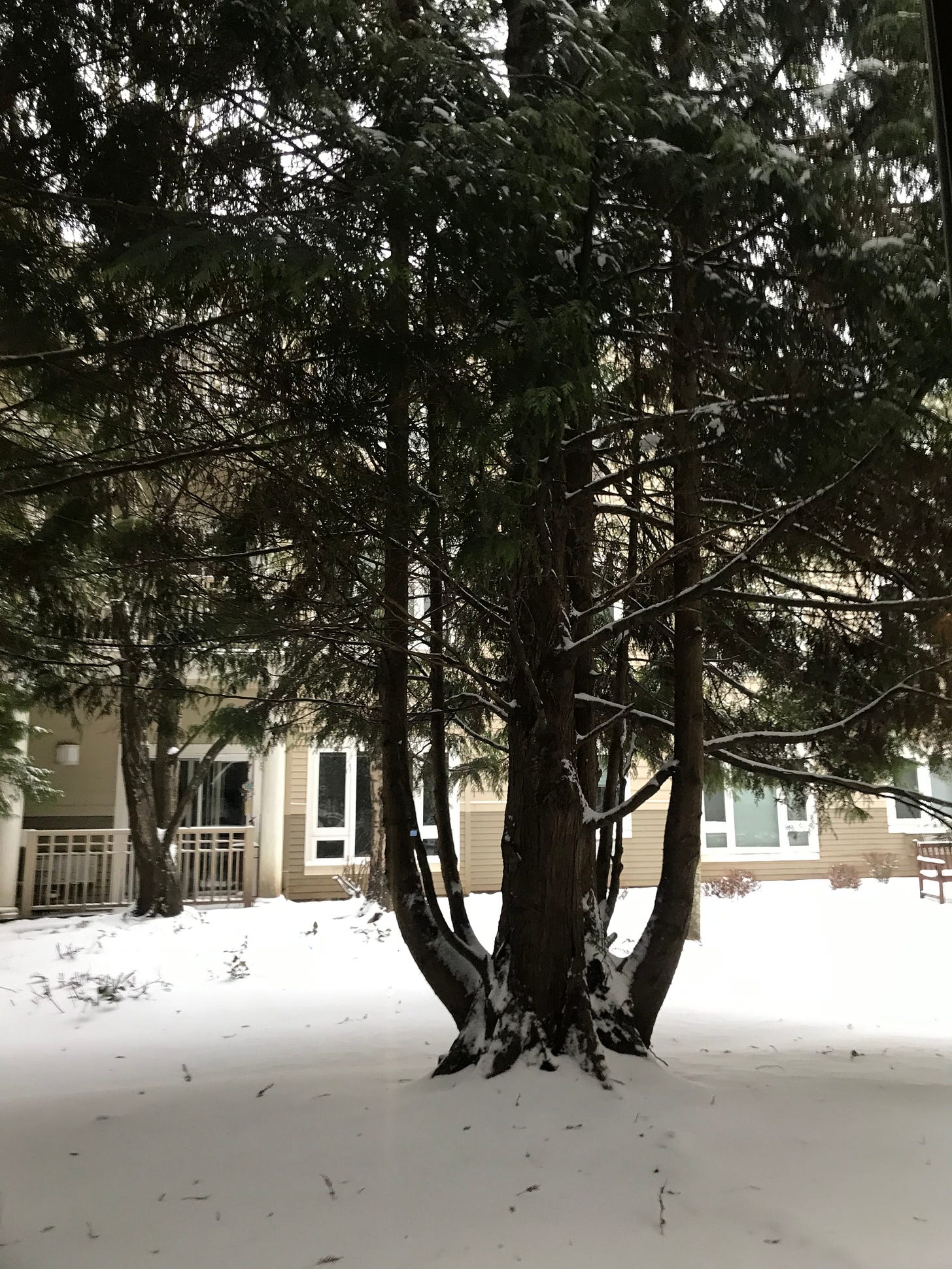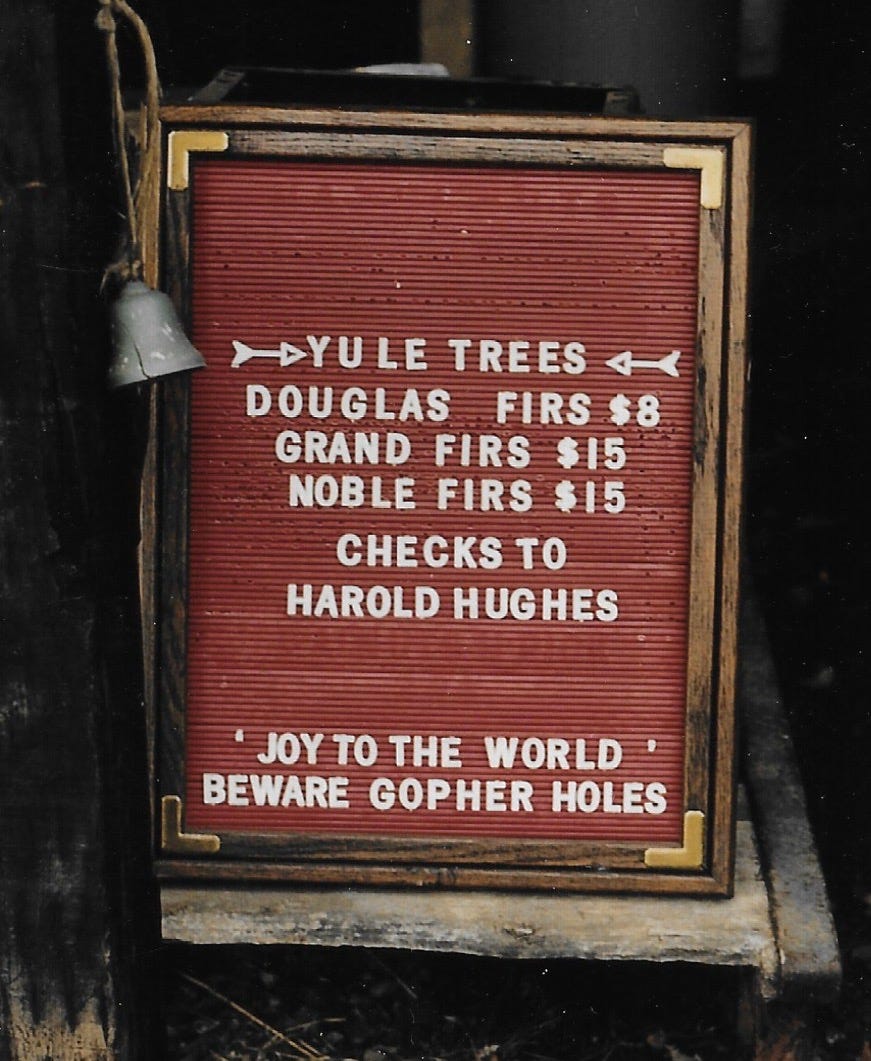Check in
Take time, feel gratitude, forgive. Remember what matters: Spirit, authenticity, justice, words. Let the work come. Don’t force it. Wait, and inspiration will come sooner than you think. Let your little story come out and play.
An era ends
Grace Kent, the last charter subscriber to The New Yorker, died recently at the age of 103. Through her last days, she was still reading the magazine to which she and her husband, Seymour, had subscribed beginning with the second issue. She was born in 1919 and was too young to have been reading The New Yorker’s first edition in 1925. But Seymour, 12 years her senior, picked up the first issue at a Manhattan newsstand and immediately signed up.
Another era ended long before
Apropos of the season, for many years I cut my own Christmas tree at Puzzle Tree Farm outside Newberg, Ore. It was owned by Harold Hughes, an editorial writer for The Oregonian, and his wife, Winnie. They have both been gone now for many years.
I’ll never forget Winnie telling me of the time she came home from the store and stowed some items in the upright freezer. A while later, she realized she hadn’t seen her cat. She opened the freezer to find the cat, still breathing, its eyes buggy with shock and cold.
Memorizing poetry
In interviewing elders where I live, I’m surprised to find few of them had to memorize poems in school, although several said they learned the Gettysburg Address.
No one required me to memorize poems, but I learned a fair amount of poetry on my own. As a teen, I lugged The Golden Treasury of Poetry, edited by Louis Untermeyer and copiously illustrated by Joan Walsh Anglund to various babysitting gigs.
Does anyone even read poetry these days? Βeyond those crowd-pleasers Molly Oliver, Audre Lorde, bell hooks, Alice Walker, Langston Hughes or Rumi? I did some looking for modern poets, using not the stacks of the Multnomah County Library but Google. Then, from the library, I ordered up some books from a lot of poets I never heard of. The resulting epiphany is below.
Do you know any of these poems, these lines from the beginning or the middle or the end?* (Only one of them is Shakespeare.)
The world is too much with us Who has seen the wind? The little lame balloon man April is the cruelest month Whan that Aprille with his shoures soote Lives there a man with soul so dead When that I was and a little tiny boy A damsel with a dulcimer I celebrate myself I’m nobody, who are you? Once upon a midnight dreary The woods are lovely, dark and deep I must go down to the sea again There is no joy in Mudville The thoughts of youth are long, long thoughts He hath put down the mighty from their seats All shall be well ’Twas brillig Between the dark and the daylight A bunch of the boys were whooping it up in the Malamute Saloon Death, be not proud Look on my Works, ye Mighty, and despair! *I didn’t research these titles; I just let them come to me. Of course the list is idiosyncratic. If you have lines to add, or to stump me with, please comment.
Poetry in song
Poetry is always with us, even when it’s just a song lyric. These tug at you with cords—or chords—of remembrance.
You must remember this My life goes on in endless song Lift ev’ry voice and sing One of these mornings, you’re gonna rise up singing Only you beneath the moon and under the sun (oh, that rhythm!) O beautiful for spacious skies Cheer up, my brother, live in the sunshine Love me tender West Virginia, mountain mama Mounds and mounds of angel hair Frothy billows I keep a close watch on this heart of mine Don’t change a hair for me This’ll be the day that I die I’m impressed with my attorney Bernie Just before the battle, Mother, I am thinking most of you I see trees of green, red roses too It goes like this, the fourth, the fifth You can’t always get what you want Make new friends, but keep the old Ne me quitte pas Sont les mots qui vont tres bien ensemble I love Paris in the springtime
Make room for poems
Poetry is in the air. It reaches you every day, if only via the piped-in music at the supermarket. Take it where you can get it—the dust of old books, the tinny sound of store speakers, or the crisp pixels of your trusty tablet. Smile. And remember.
You remember.
Even if you don’t memorize, you remember.

Forest Perfume
~A poem of my own~
If I could bottle the scent of the woods . . . It would be smoky Warm Wind-washed Laced with decay and dirt Sun and dust And a dash of dog pee. Low notes: floral and leaf mold High notes: ivy and crushed cedar The backbone: fir resin Stirred up by birds’ wings, Gently beating. This essence, Tinged with blue jay feathers And owl’s toes, Precious beyond measure— And fleeting, Elusive as a dragonfly’s flight.
Reading poetry
I have avoided reading poetry, not because it is difficult or boring, but because it terrifies me.
The intensity. Will I understand it? The rhythm of reading. Most poems are short, so you read another and another, like just one more cigarette, when what you really need to do is stick with the first one, turning it over, examining it, making it a part of you.
For that is what poetry is. A way of reshaping the world. You know a poem is “good” when it changes your world.
And what makes a poem deserving? Editors matter, anthologies. Brave chapbooks. Grants. Faculty positions at colleges, many of them with very small enrollments.
On the flip side of reading too many poems, how can anyone read a long poem in one sitting? Beowulf, the Odyssey, the Tao Te Ching—these take weeks to absorb.
As I age, reading . . . changes. I often—often—take a year to read a book, digesting a few paragraphs at a time. How was I once able to read many books a month, a week?
How to read a poem
I can’t adequately honor poems unless I read only a few at a time. They are often so short, the temptation to overindulge is great. No matter how many or few I digest, I will forget. I can’t remember them all.
Do teachers remember all the children they’ve taught? Well, yes, maybe. But they spend hours, days, months with those children. Could I do that with a class of poems, say 30 very deserving ones? What about all the others?
I imagine the forgotten poems packed away, like forgotten tin soldiers, wrapped in cotton wool and stored each in its own little cubbyhole. It's just that I’ve lost the map to those cubbies.
In The Best American Poetry 2018, edited by Dana Gioia, the first poem my serendipitous eye lands upon changes my life. It’s a poem I would have liked to have written, perhaps could have written . . . not this exact poem, of course, but something like it.
It’s titled “Window” and it’s by Robert Morgan. I can’t quote it here because I don't have permission. I just googled it and it is not anywhere on the Internet for free. Which is as it should be. Allow me to share just the last two lines:
beyond the cattails in the ditch, the dying weeds, the rotting mulch.
The poem is about woods and trees, leaves and color. All favorite themes of mine that, as Hopkins would say “here—buckle!” into an integrated whole. Twelve short lines, a complete world view, subtle, unique.
To read the rest of the poem, you will have to look it up at Southern Poetry Review, or in The Best American Poetry 2018. It’s been a few months since I asked, but I haven’t heard back from the publisher’s permissions department.
Words of the year
~Actually, in some cases, two words~
The Economist’s Johnson columnist picks hybrid work, the new amalgams of on-site and remote work that are changing office landscapes worldwide. As Johnson puts it:
As a coinage, hybrid work is no beauty. But it will reshape cities, careers, family life and free time.
For the Oxford English Dictionary, the word of the year is goblin mode, chosen by popular vote. The OED defines it as
a type of behaviour which is unapologetically self-indulgent, lazy, slovenly, or greedy, typically in a way that rejects social norms or expectations.
In further explanation, the CBC (Canadian Broadcast Corp) opines:
Think dirty sweatpants, a messy home, piles of junk food and an overall attitude of not caring what what anyone thinks of you.
Merriam Webster’s word is gaslighting, chosen because it’s the most searched. Other big searches in 2022 were for oligarch, omicron, codify, sentient, loamy and LGBTQIA (adding “intersex” and “asexual” to the more familiar terms).
The dictionary site notes that the original meaning of “gaslight,” from the 1944 film of the same name, meant to psychologically manipulate someone. However, the meaning has morphed:
But in recent years, we have seen the meaning of gaslighting refer also to something simpler and broader: “the act or practice of grossly misleading someone, especially for a personal advantage.” In this use, the word is at home with other terms relating to modern forms of deception and manipulation, such as fake news, deepfake, and artificial intelligence.
Too many words
I also wanted to write about the reason why “kidnaped” was the standard spelling for “kidnapped” for so many years, but this post is already overwhelmingly long. That explanation will have to wait.
Check out
Your assignment this week: write less.
Think of the negative space in a picture. The part that is not the image but without which the image could not exist.
This is a challenging concept just now. I remember as an editor complimenting writers for what they left out of their stories—the details, sometimes even interesting, that would nevertheless slow the narrative or pull it off track.
A phrase you might have heard is “kill your babies.” Those are the felicitous thoughts and soaring turns of phrase that you are so proud of but that, when you look critically at what you’ve written, don’t really propel the narrative.
Even if you think you’re a lean writer, try this: Do a word count, then slice away a third of the words. Start with adjectives like “very.” Proceed to squishy verbs like “seems.” Then tackle extraneous adverbs, such as “up” in phrases like “fold up,” or “down” in phrases like “kneel down.”
Avoiding diarrhea of the cursor is a big holiday gift you can give all of us.
I just took my own medicine. I cut this post by about a third. And it’s still too long.
—30—





Hey, Catherine,
I already had something by Whitman and Frost. (I really wanted to put in something from “Once by the Pacific”). I don’t recognize the third. Even Google didn’t help.
Did you get which one was Shakespeare?
I sing the body electric.
An odd planet, and those on it are odd too.
Something there is that does not love a wall.